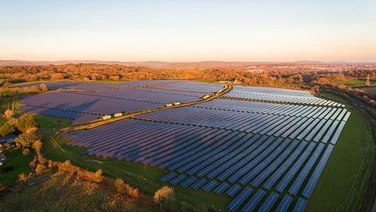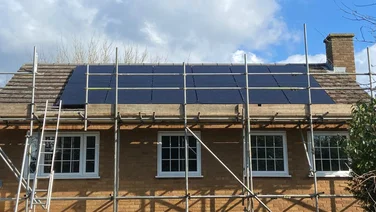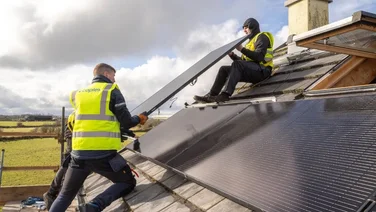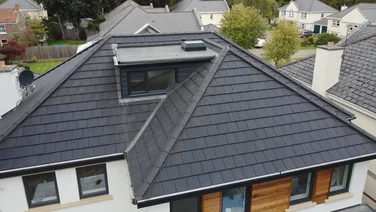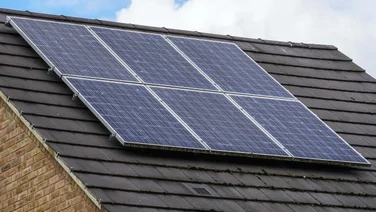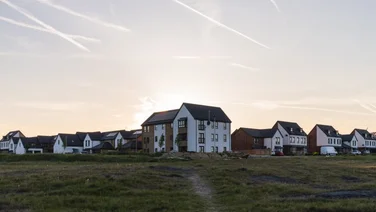- What is solar panel output?
- How much power do you need from your solar panels?
- How much power will a solar system generate?
- Different sizes of solar panel system
- What happens if my system produces more electricity than I can use?
- Types of solar panels
- What factors affect how much electricity a solar panel generates?
- How to monitor solar panel output
- How will you know how much electricity your solar panels generate?
- Can I run my house on solar power only?
- Finding an installer
- Summary
- A solar panel’s power output is measured in kilowatts (kW)
- A three-bedroom house will typically need a 3.5 kilowatts peak (kWp) system
- Solar panels cover roughly 50% of household electricity needs

This tool will instantly provide you with the amount of electricity your chosen panels will produce in your region and the roof space they’ll take up.
Just choose your region, the number of solar panels you’re looking to get, and the panels’ peak power, and you’ll immediately find out how much electricity your solar panel system will produce on average each year.
What is solar panel output?
Let’s start with the basics. A solar panel’s output is measured in kilowatts (kW).
The higher the solar panel’s wattage, the more electricity it can produce. The output will also be affected by factors such as where you live, the angle of the roof, and the direction your home faces.
A 350W solar panel will produce an average of 265 kilowatt hours (kWh) of electricity annually in the UK. For context, a kilowatt hour is used to measure the amount of energy someone is using; you’ll often find it on your energy bills.
The average three-bedroom house uses 2,700 kWh of electricity per year, and to produce a similar amount, it would need about ten 350W solar panels.
How much power do you need from your solar panels?
To work out how much power you’ll need from your solar panels, you need to know how much electricity you use in a year. You can find this out by looking at your bills or using a smart meter if you have one.
You can find your average daily usage by dividing your annual usage by 365 (the number of days in a year).
Once you know your electricity usage, you’ll want to choose a solar panel system that produces a similar amount. Solar panel installers will typically be able to advise you on this based on your electricity usage and the solar panels they have in stock.
How much power will a solar system generate?
The average number of daylight hours a solar system gets varies by location, determining how much power it will generate.
To calculate how much power a solar system will generate, multiply the solar panel wattage by the number of daylight hours and then multiply that by the number of solar panels you have.
For example, with 350W solar panels, the total kWh generated each day equals 350 x number of panels x hours of sunlight.You can find the number of daylight hours you get each month in the UK using websites such as Project Britain or Date & Time.
Different sizes of solar panel system
Check out the table below to see how much electricity different-sized solar panel systems can produce for various properties.Or, use our solar panel output calculator to work out what number and peak power output of panels you need.
| Property size | Annual electricity usage (kWh) | Solar PV system size (kW) | Number of panels | Annual electricity output (kWh) |
|---|---|---|---|---|
1-2 bedrooms | 1,800 | 2.1 | 6 | 1,587 |
3 bedrooms | 2,700 | 3.5 | 10 | 2,645 |
4+ bedrooms | 4,100 | 4.9 | 14 | 3,703 |
You can also read about 5 kW solar panel systems specifically and determine if this size system is right for your property.
Are you ready to see how much solar power can save you?
Generate free, green electricity Reduce your electricity bill by up to 64% Get paid for what you don't use
What happens if my system produces more electricity than I can use?
Your solar panel system might produce more electricity than you can use because you can (usually) only use the electricity it produces in real-time.
If you’re out of the house during the day, especially in the summer when solar panel output is high, you might be unable to use all the electricity it generates.
You have two good options. T First of all, you can pair a solar panel system with a storage battery, which allows you to store any surplus energy your panels produce so you can use it later, typically in the evening when solar panels don’t generate electricity.
Secondly, you can also get paid for the excess energy you export back to the grid through the Smart Export Guarantee (SEG) and use the money to offset electricity you need to buy from the grid for use in the evenings and at night.
Solar panel output throughout the year
Although solar panels work all year round, their output levels fluctuate throughout the year. This is due to changes in the amount of sunlight exposure the panels get each month.
As you might have guessed, solar panel output reduces during the winter in the UK—on average, by 83%.
This is because the days are shorter in winter, meaning panels aren’t exposed to as much sunlight as in summer. The sun is also lower in the sky during the winter, which can impact sunlight exposure and is usually cloudier.
Is it still worth having solar panels?
Yes, it’s worth installing solar panels in the UK because of the fantastic savings you can make on your bills. Although homeowners in a three-bedroom house typically need to spend about £7,026 for 10 panels, they’ll save 70% on their electricity bills.
According to our latest calculations, the average homeowner can also break even on their solar panels after 15.46 years.
Is it even worth it in Scotland? Is it as far north as you can go in the UK? Yes, it’s even worth getting solar panels in Scotland.Want to learn more? Head to our page Are solar panels worth it in the UK?
Is it worth having a solar panel with a solar battery?
This one’s tricky. On the one hand, if you don’t have a solar battery, you’ll most likely lose around 50% of your solar panels’ power, with all the surplus energy going straight to the grid.
On the other hand, solar batteries tend to cost around £4,000 for a 2.1kWp system, which can be a barrier for many – you’ll also need to buy two of these throughout a typical solar panel’s lifetime. Typically, it’ll take homeowners with one to two bedrooms 26.3 years to break even on a solar plus storage system.
You can learn more about this on our page Are solar batteries worth it in the UK?
Where do you want to install solar panels?
Get startedWant to get a better idea of what it’s like to own a set of solar panels? Check out our case study with Shirley Ward – a 73-year-old retired office worker, based in North Yorkshire.
Shirley has a 2.4 kW solar array and a Solax battery, and managed to break even on the system in 10 years. Despite electricity prices increasing around the world, Shirley’s panels have brought her energy bills down to £15 a month, instead of £50.
Check out the full interview with Shirley to learn more about solar panels.
Types of solar panels
The type of solar panels you get can affect electricity output since some types are more efficient than others.
A solar panel’s efficiency indicates how well it converts sunlight into electricity. The higher the efficiency rating, the more electricity it will produce per square metre.
Here’s what you can expect from different solar panel types:
- Monocrystalline: 18-24% efficient. The most efficient type of solar panel available for residential installations, they have a high output
- Polycrystalline: 13-16% efficient. One-third less efficient than monocrystalline panels, so they have a slightly lower output per square metre, but they’re cheaper
- Thin film: 7-13% efficient. Have a much lower output and are typically only used on boats or caravans as they’re lightweight
- Solar tiles: 10-20% efficient. Made to look like regular roof tiles for a discreet look. But they’re 40% less efficient than the average solar panel, which means a lower output
- Concentrator Photovoltaics (CPV): 35-50% efficient. Sunlight is concentrated with curved mirrors or lenses, which leads to a high output. Unfortunately, these panels are typically only available for large-scale commercial projects
- Bifacial: 10-30% more efficient than regular solar panels, they generate electricity on both their front and rear surfaces
High output solar panels
If you want to get the most out of your solar panels, you might want to look into products with a high output rating.
In the table below, we’ve listed the most powerful panels on the market to help you get a headstart.
| Company | Solar panel model | Power/output |
|---|---|---|
Seraphim | SRP-670-BMC-BG | 670 W |
Seraphim | S5 Series SRP-670-BMC-HV | 670 W |
AIKO | AIKO N-Type ABC White Hole Series (72 Cells) | 620 W |
AIKO | AIKO N-Type ABC Black Hole Series (72 Cells) | 615 W |
Jinko | Tiger Neo N-type 72HL4-(V) | 585 W |
Longi | Hi-MO 7 (LR5-72HGD-580M) | 580 W |
JA Solar | JAM72D40 | 580 W |
Jinko | Tiger Neo N-type 72HL4 | 575 W |
Sharp | NB-JD570 | 570 W |
Tongwei Solar | Silver Frame Shingled Module | 560 W |
These figures were sourced from our research into the best solar panels. Want to take a look at the findings? Head to our Guide to the Best Solar Panels in the UK.
What factors affect how much electricity a solar panel generates?
If conditions aren’t ideal, your solar panels’ efficiency will decrease, meaning they won’t be able to work at their maximum power output.
Several factors can impact how much electricity a solar panel can generate. These include:
- Direction and angle of your roof – A solar panel works best when installed on a south-facing roof at a 35-degree angle. However, solar panels can still produce a decent amount of power on an east-facing or west-facing roof and at an angle between 10 and 60 degrees. Most houses will fit this description – which is fortunate since you can’t change the angle of your roof without a lengthy, difficult process that involves a complicated frame system and new planning permission. You can learn more on our page: What’s The Best Angle and Direction for Solar Panels?
- Shade – Make sure your solar panels are installed in direct sunlight. If just a tiny amount of shade covers a solar panel, it can significantly reduce how much electricity it can generate.
- Time of the year – A solar panel will produce more power in the summer when the days are longer and there are more sunshine hours. If it gets too hot, however, solar panels can overheat; if their temperature goes over 25°C, they’ll generate slightly less power.
- Dirt – If a solar panel is covered in debris, its power output will fall because it won’t receive as much sunlight. Manufacturers usually recommend getting them cleaned twice a year, but if you can’t afford that and don’t want to do it yourself, every two years will still be helpful. The best way to clean solar panels is gently, with a nonabrasive sponge and soapy water.
You can find out more about our helpful guide, Reasons Solar Panels Lose Efficiency Over Time (And How to Slow It Down).
How to monitor solar panel output
It’s important to monitor your solar panels’ performance regularly to ensure they’re generating the expected amount of power. If your solar panels’ power output is particularly low, it could be a sign of a problem.
One way you can do this is by checking the solar panel meter, which should be accessible in your home. This meter will record the amount of electricity your solar panels produce.
Some solar brands have rolled out online monitoring tools to make things even easier. These tools allow you to see how much power your solar panels are generating on your computer or phone.
There are also apps that solar panel owners can download that can give you an insight into how your system is running. Some of the most popular apps include:
- SolarEdge Monitoring
- Energy Monitoring & Analysis (EMA)
- Enphase Enlighten
- SMA Sunny Portal
How will you know how much electricity your solar panels generate?
Your solar panels will come with a meter that should be placed in an accessible location within your home. This meter will record the amount of electricity your solar panels produce.
Some solar brands are also rolling out online monitoring tools, which allow you to see how much power your solar panels are generating with the click of a button on your computer or phone.
As solar panels require virtually no maintenance, it can be easy to forget them once installed on your roof. However, we’d recommend checking them regularly to ensure they’re clean and in good condition.
It’s worth monitoring your meter frequently, too, to make sure your solar panels are generating the expected amount of power. If your solar panels’ power output is particularly low, it could be a sign of a problem.
Can I run my house on solar power only?
Yes, it’s possible to run a house solely on solar power.
Going completely off-grid requires a lot of financial investment – not only will you need to fork out at least a few thousand pounds for the solar panel system, but you’ll probably need to invest in more than one battery to store enough electricity to cover all your needs.
Remember, solar panel output drops by roughly 50% during the winter in the UK, so you’ll need to store enough solar energy throughout the year to supplement this.

Finding an installer
Feeling more clued up on solar panel output? Perhaps now’s the time to make the switch to solar.
According to our National Home Energy Survey, the majority of people want to go solar.
We can make the comparison stage easier. You only need to enter a few details in our easy-to-use comparison tool – then put your feet up and let us do the hard work. We’ll pass on your information to our suppliers, who’ll contact you shortly with free quotes for you to compare.
Summary
- Ready to go solar? Our calculator takes the guesswork out of choosing the right system for your home.
- Discover exactly how much energy your panels can produce based on your location and setup.
- Maximise your savings and minimise your footprint with the right-sized solar panel system.
- Find out if adding a solar battery is worth it for your lifestyle and energy usage.
- Explore the most powerful solar panels on the market and see what fits your needs.
- Compare quotes in minutes and take your first step toward clean, cost-effective energy today.


